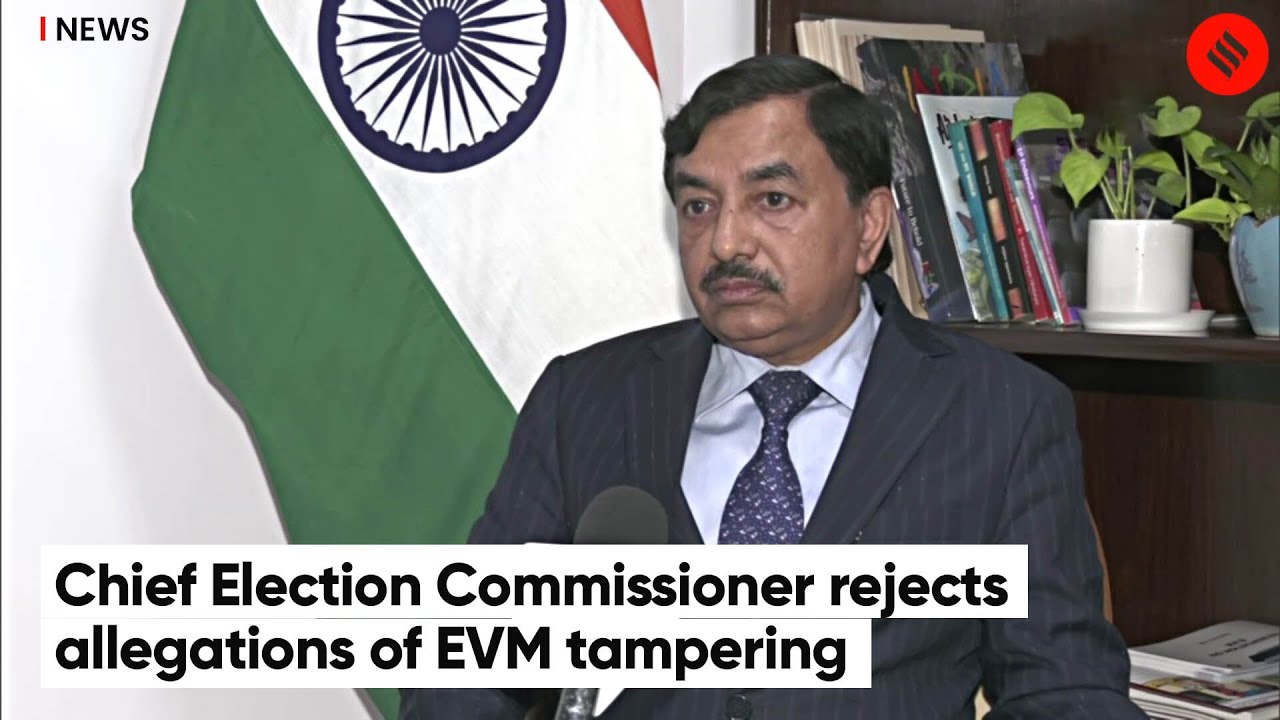


The Election Commission has put an end to speculation about electronic voting machine (EVM) manipulation, stating that the machines are tamper-proof and have consistently upheld the principles of fair elections. Chief Election Commissioner Rajiv Kumar also addressed concerns about alleged discrepancies in voter lists, asserting that the preparation of electoral rolls is a transparent process involving political parties at every stage. These announcements were made as the dates for the upcoming Delhi Assembly elections were announced, with polling to take place on February 5 and counting on February 8.
Electronic Voting Machines (EVMs) in India: A Comprehensive Overview
Electronic Voting Machines (EVMs) have been widely used in Indian elections since 2000 to ensure the accuracy and transparency of the voting process. Despite initial skepticism, EVMs have proven to be a reliable and secure method of casting votes.
Background
Concerns over election rigging and fraud led to the introduction of EVMs. Traditional paper ballots were susceptible to manipulation, forgeries, and human errors. EVMs were developed to address these issues and provide a more efficient and secure voting system.
EVM Technology and Security
EVMs consist of two main units: a Control Unit and a Balloting Unit. The Control Unit is kept with the presiding officer and controls the voting process. The Balloting Unit is used by the voter to cast their vote.
EVMs employ advanced encryption techniques to prevent tampering. Each EVM is equipped with a unique identification number and has multiple layers of security to protect against hacking or manipulation.
Allegations of Manipulation
Despite their proven security record, EVMs have faced allegations of manipulation. However, these allegations have been repeatedly debunked by independent experts and election authorities. The Election Commission of India (ECI) has conducted rigorous tests and audits to ensure the integrity of EVMs.
Recent Developments
In 2023, the ECI reiterated the tamper-proof nature of EVMs and dismissed speculations about manipulation. Chief Election Commissioner Rajiv Kumar emphasized the transparent process of preparing electoral rolls, involving political parties at every stage.
This announcement came ahead of the upcoming Delhi Assembly elections, scheduled for February 5, 2023. The ECI has implemented various measures to ensure the smooth conduct of the elections, including the deployment of EVMs at all polling booths.
FAQs
1. Are EVMs hackable?
EVMs are highly secure and have not been proven vulnerable to hacking. They employ advanced encryption and have multiple layers of security to prevent tampering.
2. Can votes be deleted from EVMs?
No. EVMs cannot delete votes once they are cast. Each vote is securely stored in the EVM's memory and cannot be manipulated or deleted.
3. Why not use paper ballots instead of EVMs?
Paper ballots are prone to errors, fraud, and manipulation. EVMs provide greater accuracy, transparency, and security, ensuring that votes are counted fairly and accurately.
4. What happens if an EVM malfunctions?
EVMs are designed with backup systems to minimize the risk of malfunction. In case of an issue, the affected EVM is replaced with a spare machine.
5. How can I verify that my vote was counted accurately?
After casting your vote, you will receive a Voter Verified Paper Audit Trail (VVPAT) slip. This slip displays the candidate you voted for and serves as a physical confirmation of your vote.

Prime Minister Narendra Modi celebrates Diwali with Navy personnel aboard INS Vikrant, praising the warship's role in instilling fear in Pakistan. He commemorates India's military might and the bravery of armed forces in Operation Sindoor, while also highlighting INS Vikrant as a symbol of Atmanirbhar Bharat and Made in India. The festive celebrations on board consisted of cultural performances and an air power demonstration, making the occasion deeply symbolic and unforgettable.

Prime Minister Narendra Modi celebrated Diwali with the crew of India's indigenous aircraft carrier INS Vikrant, describing the ship as a symbol of Aatmanirbhar Bharat and Made in India. He saluted the Indian Navy, Air Force, and Army for their courage, skill, and coordination, especially during the 1971 victory over Pakistan. The Prime Minister also highlighted the progress towards self-reliance in India's defence production, with thousands of items now being manufactured domestically and a new indigenous warship or submarine being inducted into the Navy every 40 days on average.

On October 21, Defence Minister Rajnath Singh will honor the sacrifices made by police personnel at the National Police Memorial on Police Commemoration Day. The Memorial serves as a symbol of the strength and selflessness of police officers who have laid down their lives in the line of duty. The central sculpture, 'Wall of Valour', and museum at the Memorial provide a sense of national identity and pride for Police Forces.

Prime Minister Narendra Modi made a surprise visit to INS Vikrant, India's flagship aircraft carrier, on Diwali eve 2025. This marked his first visit to the high seas to celebrate with the Navy personnel stationed there. His visit included cultural activities, a yoga session, and an inspiring address to the naval staff, further strengthening the bond between the leader and the armed forces.

Prime Minister Narendra Modi celebrated Diwali with the Indian Navy on the INS Vikrant aircraft carrier stationed off the coast of Goa and Karwar. The cultural programme organized by the Navy was described by PM Modi as an unforgettable experience. He also praised the dedication and creativity of the naval personnel and highlighted the success of the armed forces in Operation Sindoor with a patriotic song "The Vow of Sindoor". In addition, PM Modi also addressed the country's security forces and lauded their efforts in combating Naxalism.

In a powerful Diwali speech on board INS Vikrant, Prime Minister Narendra Modi lauded the coordination of India's armed forces in Operation Sindoor, which led to a swift surrender by Pakistan. He also emphasized the importance of self-reliance in strengthening the armed forces and highlighted India's progress in manufacturing essential military equipment domestically. He further announced India's goal to become a top defence exporter, with a significant increase in defence exports in the last decade.

Prime Minister Narendra Modi continued his tradition of celebrating Diwali with India's armed forces by visiting the INS Vikrant off the coast of Goa and Karwar. He praised the Navy personnel for their dedication towards the security of the nation and expressed his gratitude to the families of the brave soldiers. PM Modi also witnessed an impressive display of precision and prowess during an Air Power Demo on INS Vikrant, showcasing the technological excellence of the Indian Navy.

Prime Minister Narendra Modi celebrated Diwali 2025 with Indian Navy personnel aboard the indigenous aircraft carrier INS Vikrant, highlighting the ship's strength and psychological impact on adversaries. Commissioned in 2022, the carrier is a symbol of India's self-reliance and strategic resolve. PM Modi praised the bravery and dedication of the naval personnel, reinforcing the bond between the armed forces and the government.

The Allahabad High Court has directed the Jailer of Hisar Central Jail in Haryana to provide an explanation on how self-styled Godman Sant Rampal, currently held in the jail, is able to write and distribute books that allegedly target Hindu deities. This comes after a plea was filed by Hindu Front for Justice, calling for a ban on the books and action against Rampal. The petition alleges that the books contain offensive and provocative language and have been distributed through electronic communication platforms, causing disharmony between religious communities.

Following the latest string of scandals involving Prince Andrew, King Charles was photographed attending a Sunday morning service near his Scottish estate. The King wore a solemn expression as he drove to Crathie Kirk, displaying tension amidst a tumultuous time for the royal family. Recently, Prince Andrew announced his resignation from the Duke of York and membership of the Order of the Garter, the oldest chivalric order in the UK.